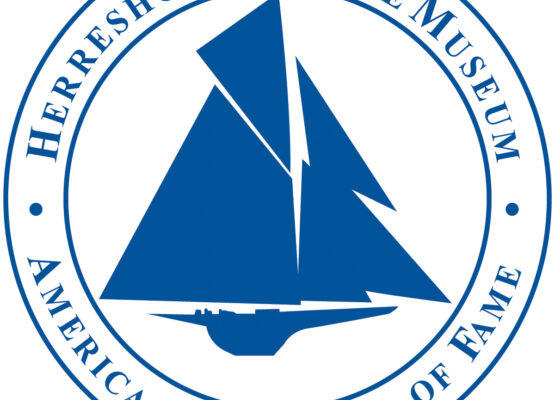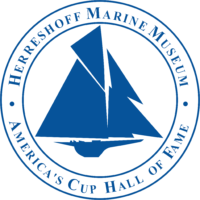“She’s No Cruiser” : story of a beloved Watch Hill 15
Submitted by Dick Holliday from Watch Hill, RI

In 1922 some of our Watch Hill Yacht Club members commissioned Captain Nat Herreshoff to design a boat for our adult sailors which would be suitable for our shallow Bay and adjacent Fishers Island Sound and Block Island Sound. Captain Nat took his Buzzards Bay 15 which he had designed in 1898 and penciled in a few changes, the hull was almost identical but he specified the then modern leg-of-mutton Marconi rig. Eleven men stepped forward with checks and the fleet of eleven boats was delivered to Watch Hill in the spring of 1923. Forty-five years later, having been the mainstay of the Club racing program, the fleet had dwindled to four or five (several had migrated out of the area). WHYC Commodore Avard Fuller led and partially financed an effort to copy those wonderful sloops with durable fiberglass beauties. A mold was taken from the original Herreshoff prototype (HMC #880) and in 1969 the first two of these, called Watch Hill 15s, were launched with new, tall Marconi rigs (tapered aluminum mast and fixed backstay). I was invited to crew on Avard’s prototype, HUSSY, that year and purchased it from him in 1971. HUSSY is still a prized possession for our family and we now have our third generation racing her. With nearly 50 WHYC races each season we have many stories and fond HUSSY racing memories. In addition we’ve had lots of fun daysailing, mostly in Fishers Island Sound and participating in the annual Round the Island Race (Fishers) but we’ve had only one cruise. Anyone who knows the Buzzards Bay 15 (E-class), or the 1923 wooden Watch Hill Herreshoffs would know that their near-twin fiberglass WH-15 is not a proper cruising boat. There is a small area under the long foredeck which can be crawled into but the cockpit floorboards end at the main bulkhead. There is no provision for sheltering from spray, rain and sun. And HUSSY’s 15 foot waterline says all that needs to be said about transit time on longer legsl. She is set up with no reef points in the main and she is nearly impossible to sail without her jib. Need I mention that she has no electronics and along with low freeboard and non-self-bailing cockpit she’s at a great disadvantage in socked-in or heavy weather. Long before hand-held navigation and communication aids we now enjoy I decided in 1974 that my eight year old son and I would sail out to visit dear friends in Menauhant (East Falmouth, MA). We had charts and a compass, period; not even a hand bearing compass. This seemed bold, especially the Rhode Island Sound crossing, but it seemed manageable and it certainly provided the possibility for a special father-son experience. Hoping to avoid any of the Elizabeth Island holes it seemed it might be best to go south of Sow and Pigs. Somewhere along my way through life I’ve learned that every plan needs a Plan B and while I’d like to say we had one well formed before leaving Watch Hill there was really no Plan B. As captain and navigator I knew we had a few good options on the Rhode Island and Massachusetts coasts but some of them were a bit far apart if socked in or heavy weather mentioned above should develop. And so it did; on day one. As we slipped through Watch Hill Passage I had the comfort of knowing that almost all of the next 18 miles would be easy navigating; keep the beach to port until reaching Pt. Judith’s Harbor of Refuge. As I recall we had not gone much beyond Weekapaug Point when it socked in. Thinking it might burn off as the sun climbed we just hugged the beach a little closer. Those who know that coast know that there’s not much trouble along that stretch in a centerboard sloop which draws less than five feet with the board down. Seeking refuge in Pt. Judith our next challenge was to find some place where we could drop the hook and we found that four miles inland from the Harbor of Refuge in the Upper Pond in Wakefield. Indeed the weather faired, reopening possibilities for our reaching Menauhant but we were already a day behind schedule. During the night good sense took a bit of a hold on the captain and we decided to do our cruising in more sheltered waters. In the morning we beat our way back down to the Harbor of Refuge and headed back west for Noank, CT. There we spent the night at Ram Island Yacht Club’s dock. On our third and final day we cruised the Thames River which has lots of Navy assets and an urban waterfront to change the scene for my son who was already tiring of listening to dad’s tales and salty tips. Late that day we returned to our mooring in Watch Hill. We had so much fun that we never tried again for a father-son cruise in our dayboat which Captain Nat surely never intended as a cruiser. But we sure have the memory of those “cruising” days together.
Share your Herreshoff Story.
We want to hear from our Herreshoff and America's Cup Hall of Fame Community.

